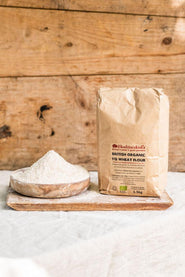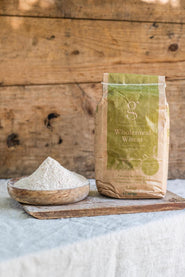Flour is an iconic kitchen staple. Even the least prolific cooks most likely have a bag tucked away somewhere, as it is the comforting starting point of so much cooking. Yet the acres of wheat crops that dominate parts of the world have without question contributed to some of the environmental destruction we have witnessed globally in the past decades.
Vast monocultures of a single arable species are vulnerable to pest and disease attack, as the sheer volume of the same crop means for example, a fungal disease can rip through the lot rather than its progress being mitigated by the presence of other species which it cannot infect. This means those arable acres are doused with pesticides and herbicides which in turn massively impact the wildlife and ecological balance of the immediate environment. Next up you have the influence of artificial fertiliser use, which firstly has an enormous carbon footprint through manufacture alone, as well as the impact of mining the constituent ingredients such as phosphate. Both the chemical inputs and the wheat varieties themselves are all typically controlled by Big Ag, but that’s the big picture of wheat production globally.

Those huge acres of grains need equally huge machinery in order to make cultivation, spraying and harvest economical, which leads to soil compaction. This means even lower biodiversity, more run-off, more soil depletion and even more environmental destruction. There is also the highly questionable practice of post harvest spraying of wheat crops with glyphosate, a powerful herbicide which chemically dries out the wheat ahead of processing. So that’s right before it is milled and processed, and heads into the food chain. Basically, not cool.
So what’s the answer? Well that’s where our heritage flours come in. Gilchester Organics in Northumberland combine the traditional art of stone milling with quality grains from nature. Instead of turning to artificial inputs to boost fertility, the family manage the rotation of crops and animals on each field to ensure the soils are never depleted of naturally occurring minerals and nutrients. They firmly believe that this natural fertility from livestock manure results in a better final grain too. There is an on-going conservation programme on the farm, now in its tenth year, of replanting hedgerows, creating ponds and habitats for ground nesting birds as well as hunting strips for owls. They have two new ponds, five acres of winter-feeding sites for birds, four new woods, fourteen kilometres of uncultivated field margins and nearly eight kilometres of new and improved hedges.

They focus their growing activities on heritage crops to produce truly natural flours and use traditional stone milling which is soft on the grain and can only grind 250kg/hour. Compared to industrial milling machines, the gentle process leaves the high concentration of minerals and vitamins intact. All our flours still have the wheatgerm and is therefore rich in essential oils. There’s also no added gluten or improvers in the flour nor are they required at baking. We’ve just added unbleached white wheat and wholemeal wheat flours to our store-cupboard collection, so do have a look. You’ll also find organic YQ wheat flour from our friends at Hodmedods. This is a genetically diverse variety of population wheat that it has been bred for Yield and Quality (hence the name) while giving it a more robust defence against pests and diseases than traditional varieties.

All this complements our existing range of sustainable pulses and grains already available, so keeping your kitchen in tune with nature just got even easier.





